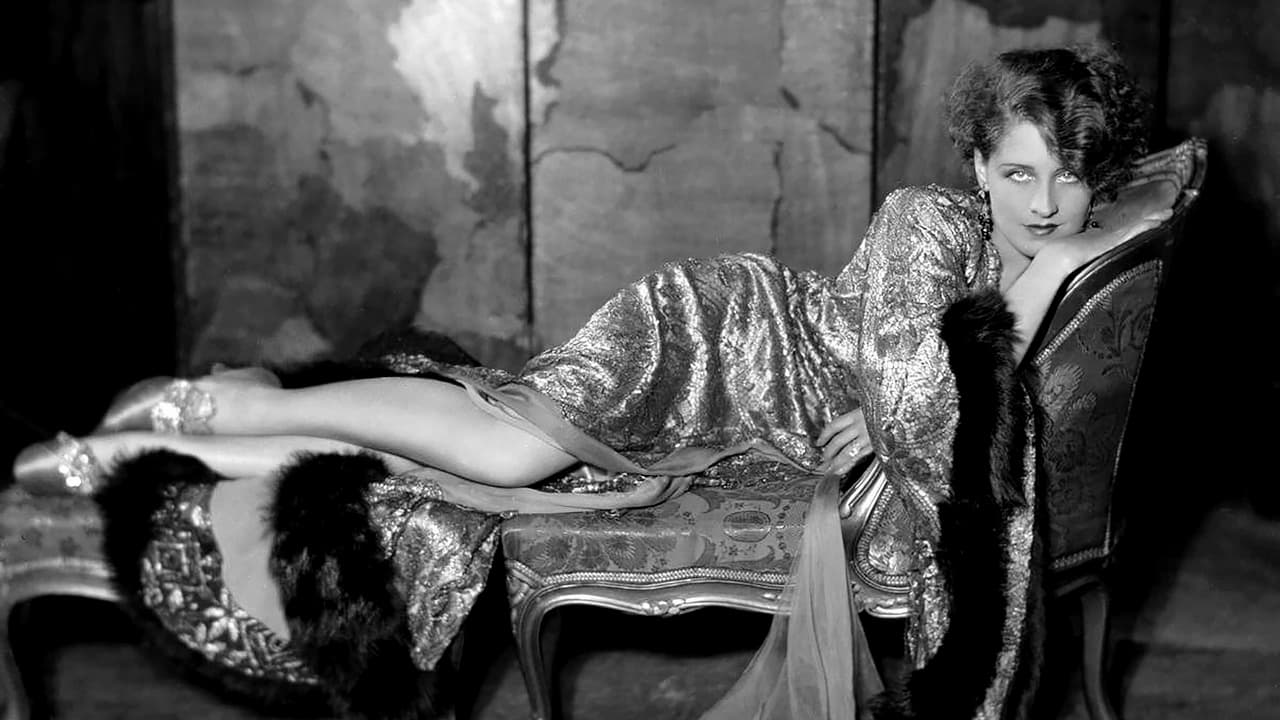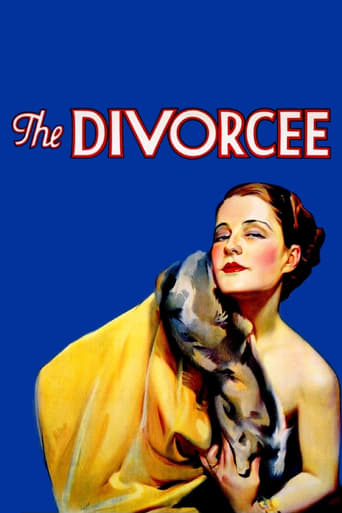

Clever and entertaining enough to recommend even to members of the 1%
... View MoreAs somebody who had not heard any of this before, it became a curious phenomenon to sit and watch a film and slowly have the realities begin to click into place.
... View MoreA story that's too fascinating to pass by...
... View MoreThis movie feels like it was made purely to piss off people who want good shows
... View More"The Divorcée" might be seen as a rather formulaic drama about infidelity and marriage, but at the time of its filming, it was a racy representation of changing mores, especially regarding gender roles in society. It revolves around a wife's discovery that her husband was unfaithful.The role of the wife, Jerry, won the Best Actress Oscar for Norma Shearer. Her performance is very emotional and believable. She is the central character who must decide whether to stand up for her dignity or to be the "good wife" and swallow her pride. Her husband, Ted, is played convincingly by Chester Morris. Though the ending is rather predictable, still the film treats the male and female characters with equanimity.It was released during the first wave of talkies, but it displays an economy of exposition (at 90 minutes running time), blending the spoken word with action quite well. The director, Robert Z. Leonard is skilled in camera movement--as he shows in this and other films. Still, "The Divorcée" is, thematically, one dimensional.
... View MoreNorma Shearer is the title character, The Divorcée. She was happily married to Chester Morris, when an ex of his shows up to rock the boat. Not believing in the adage, two wrongs don't make a right. She promptly goes out and has an affair with Robert Montgomery, a supposed good friend of Chester's. But Bob always liked her anyway. When Chester finds out about her affair they split up and file for divorce. That's essentially the plot. Will they get back together? Will love, understanding, and common sense win out? I had seen this years ago and didn't like it then; maybe I didn't like the stupidity of the characters. But, upon seeing it again recently, I found it to be surprisingly well made, realistic, and very risqué in parts. Not that I like what each other were doing any better, but I think this time I saw beyond the actual plot and recognized good acting. What's so terrible! about the film is the double standard that is implied (or is it stated right out) - that Chester didn't like her affair and had to have a divorce, but wanted her to forgive and forget his. What makes his pride so important? Why couldn't she demand a divorce! The fact is she loved him. True, if she hadn't had her affair and just let things ride, things would have gone on the same. But the main point of her affair, I think, is that she couldn't be walked over and was taking charge of the situation by being in the driver's seat. I would think the sheer idea that he was affronted by her affair would be just too much for average woman watching the film. The Divorcée is one mature film that needs to be seen more often. Norma Shearer won an Oscar for it. What was that saying about the 1930s values? That they endorsed her affair? That they felt she changed and learned her lesson? Or that, Ms. Shearer simply turned in a good performance? They did tend to give out Oscars back then for more sentimental reasons. See the film and judge for yourself.
... View MoreThe dramas of the early sound era were often awkward, phoney-looking things. A lot of this has to do with the acting. Most actors were of course experienced in silent cinema, but a lot of players with stage experience had also been brought in as was deemed appropriate for "talkies". Silent screen acting tended to be over-the-top so that meaning could be expressed without words, and stage acting also tended to be over-the-top so that meaning could be expressed to people sitting in the back row. But this excessive style didn't really work in the more authentic setting of sound cinema. Of course, movie people weren't stupid; they were aware of what did and didn't work and the industry adapted quicker than is sometimes thought.And of course, there were some actors and actresses who simply seemed to get the hang of it straight away. Norma Shearer was among a small number who survived the transition from silents to talkies with her career completely intact. One thing Shearer had was a remarkable presence – she's able to project herself with just a simple gesture or pose, and in The Divorcée she's often standing with her shoulders slightly forward in understated aggression. And within this context she is able to give a restrained performance, conveying a great deal but with a degree of credibility that makes the drama seem more believable. Shearer deservedly won the Academy Award for her work here. Compare her to previous year's winner Mary Pickford in Coquette, a slice of ham from a bygone era, and you can see how much things have changed.Let's also take a look at the director Robert Z. Leonard. He's not too well remembered these days because he isn't deemed an auteur, but at the time he was among the forefront of Hollywood professionals. Two things in particular are worth noting about his style in The Divorcée. First is that he uses a lot of camera movement to really engage us in a scene (who says early sound films were static?), often using a noteworthy pan as a character appears. Secondly, he gives us an awful lot of the interplay between characters in simple wordless glances between them, for example the jealous look of Conrad Nagel when Shearer and Chester Morris announce their betrothal, or later a silent, spiteful exchange between Shearer and Mary Doran. There was a temptation for talkie directors to shoot things before the assembled actors as if for a stage play, but here Leonard is making subtle close-ups that cut across the action, and in so doing giving depth to the story outside of the dialogue.This picture is now often classified as a "pre-code" movie for its depiction of Shearer's promiscuity after she becomes the titular divorcée, although even by the standards of the day it's pretty tame. However, thanks to its fluid direction and naturalistic acting, it is nevertheless a movie that seems a few steps ahead of its time, and points towards the increasingly sophisticated sound cinema of the 1930s.
... View MoreIt is funny how the film portrays love. In the beginning it shows the perfect relationship between Ted and Jerry in a rather comedy like fashion (e.g. as they are joking with the boy (their future kid?) who disturbs them in their love nest). Also they are talking to each other more like friends than sexual partners. At one point they kiss in front of the father and their friends, as if to prove, that their love has nothing to do with sexual desire. That's why, in my opinion, the first 20 minutes are rather dull: the relationship looks superficial.The drama kicks in with the twentieth minute when the sexual drive starts a life of its own after three years of marriage. With the sexual desire of Ted, suffering starts, and the film has its first brilliant scene: Jerry surprises Ted being embraced by a woman. Now the other side of Ted - who presumably was such a nice, perfect, asexual man - is shown: He got "plastered" one day and went to bed with another woman. For him it is the drive which made him to it, so he can say: "it is not a thing" in the sense that it is not himself, but the animal inside him that forced him to do it. So the modern question the movie rises is: how does a love relationship looks like, that isn't affected by infidelity? Can they arrive at a deeper, more honest form of love, that includes the sexual desire? The answer the movie gives, in my opinion, is no. Love and sexuality are different things. First of all the latter is associated with the parties, the booze, the jazz music, shortly a decadent, hedonistic lifestyle devoid of happiness. Secondly the somewhat lynchian scene with Dot, Jerry and Paul. It is obvious, that the relationship between Dot and Paul is neither love nor sexual - it is full of pity, guilt and reproaches. Nevertheless Jerry refers to it as a marriage worth saving. (Why? - fidelity itself is more important than love or sexuality?) In so far I think the film has a conservative touch after all. But the strength and self-confidence of the woman characters is way ahead of its time (even compared to the femme fatale of the film noir period, who were in some way or another evil by seducing the men)
... View More